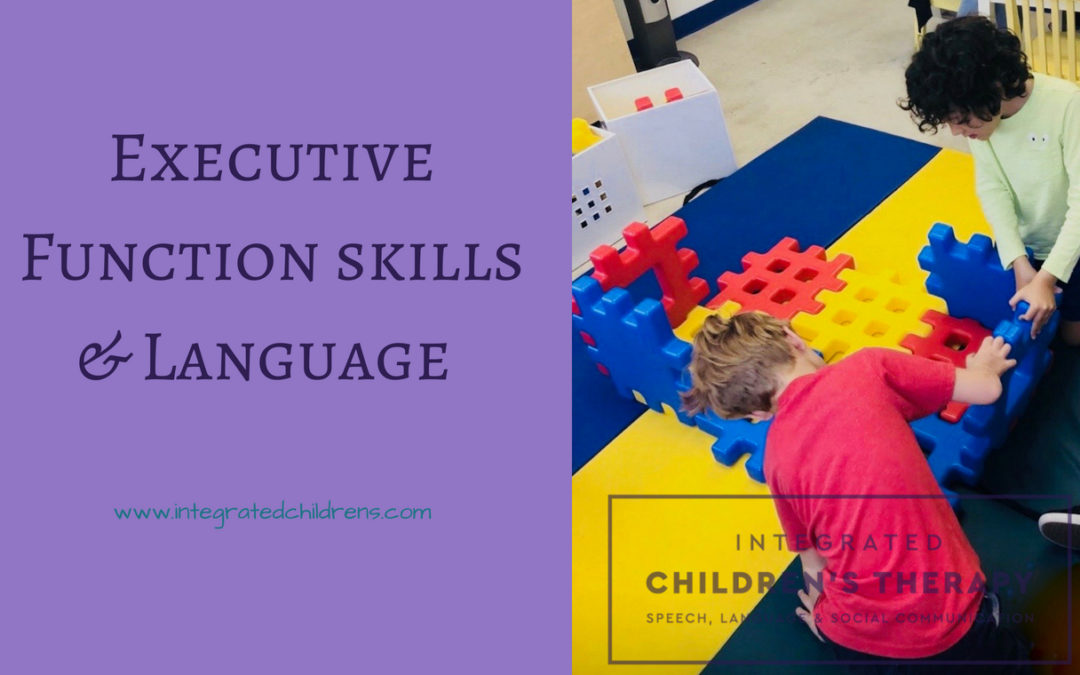If we imagine our brain as a busy highway system, executive function (EF) skills are the traffic rules that keep things running smoothly. They help us manage the constant streams of information running through our brain so we can focus, plan, accomplish tasks, control impulses and manage emotions.
EF skills and language skills are inextricably linked. In order to successfully understand language, communicate, and interact socially, we rely on EF skills to help us in these key areas:
Task Initiation — The ability to initiate a communication task such as a conversation or a collaborative project.
Flexible Thinking — The ability to remain open to other points of view when playing or collaborating, and understand implied meaning when reading or listening to someone.
Planning, Prioritizing & Organization — These help us communicate (whether having a conversation, writing a story, or even drawing) in a clear, easy-to-follow way.
Self-Monitoring — The ability to pay attention to our behavior and modify it when necessary.
Emotional Regulation — The ability to maintain our emotions within the boundaries of social expectations.
Impulse Control — The ability to control our behavior in order to respect personal space and avoid behaviors like interrupting.
Working Memory — This allows us to hold information in our minds while communicating, reading, or interacting. For example, when having a conversation we use it to follow what the other person is saying and remember what we want to say while we wait for our turn to talk.
The Link Between Executive Function Skills and Language
Here are some examples of how EF skills and language skills work together:
Understanding Language (Receptive Language)
In order to understand what he hears or reads, a child needs to sustain attention while filtering out distractions, and use working memory to retain important information. Flexible thinking helps him make inferences and predictions, as well as use context to determine the meaning of unknown words. Self-monitoring allows him to stay on track and ensure he understands what he’s listening to or reading. When he struggles with these EF skills, he may have a hard time with tasks like following directions, reading comprehension, and following or participating in a conversation.
Communicating (Expressive Language)
Tasks such as retelling a story or completing a book report rely on EF skills. A child needs to use planning, prioritizing and working memory to communicate the information in an organized way. Self-monitoring helps him stay on track and shift gears if he realizes that he’s not communicating effectively. Children who struggle with EF skills may have trouble retelling events or completing projects in a sequential, clear, and engaging way.
Interacting Socially (Pragmatic Language)
Self-monitoring, emotional regulation and impulse control help a child adjust his behavior depending on the situation (calm in the library, active at the park, not over-reacting over the loss of a game), understand when his actions are bothering others, and successfully collaborate and cooperate with others during play or at school. Flexible thinking allows him see things from another’s perspective and feel open to other points of view. Working memory helps him participate in conversations and activities. Children who struggle with EF skills may appear emotionally reactive, disregard personal space, speak “without a filter,” or have a hard time sustaining a conversation.
Understanding a child’s EF abilities helps parents, speech-language pathologists and other professionals develop effective strategies to help a child succeed to the best of his ability at home, at school, and in the social world.


Recent Comments